- Home
- Daniel Woodrell
Woe to Live On: A Novel Page 6
Woe to Live On: A Novel Read online
Page 6
The boys about shattered themselves with rude laughter upon hearing this.
“My Lord,” said Arch, all manner of unpleasant glee reflected in his face. “Them Yank gals! Them Yank gals! Why, only a whore would say that.”
The Federal now thrashed about some. He may have understood. It was pitiful.
“No southern woman would say such a thing,” Pitt Mackeson said. “Ho, ho! I cain’t wait to be in charge of Iowa!”
I couldn’t stand it. The Federal gurgled and the boys said, “Tender turtle head! Tender turtle head!” real loud.
So I shot him where he lay and put a period to the letter. My act was sudden and it stalled the boys’ laughter.
I walked off with my Colt cocked and my step steady.
Not a word was said to me.
Later on I lounged about, trying to dredge up the tart taste of a jenniton apple in my memory, and the perfumed-sweat smell of real ladies waltzing all night with someone else at a levee dance, and the gushing warmth I’d always felt when Asa Chiles had tousled my hair and called me lucky.
But all that past was a sluggish slough, and I could not flow it up to me at all.
My thoughts were just of now or tomorrow.
Jack Bull Chiles was near me but did not speak for a great stretch of time. He had been a bystander to the day but never an active part of it.
“Say, Jake,” he eventually said, “what are you knowing?”
“I feel I am knowing too much.”
“Ah. Well, forget it. Throw it down.”
“Once you are knowing it, that is hard to do.”
“Oh, hell, Jake. Too much knowledge is only a form of torture. You can do nothing with it but recognize a wider variety of agonies.”
As a philosopher my near brother was aimed in always on the practical. If a notion will pass the night for you, and lead you into another day, then believe it.
“Dogs fight,” I said. “We fight, as well. It could be we settle too many squabbles by the dog method.”
“Hah,” Jack Bull said. “Hah, young Roedel, you are sounding like some terrifically moustached old kraut groveler at this moment.” He slapped a hand on my boot. “And that is not you. That is not you. You are an American.”
I felt like this meant I had the farm but not the crop.
There would be more harsh errands to be done, this I knew, and I would do them. I knew that as well. I was in this fight to fight.
“We could have merely shot them,” I said. “No gain would have been missed if we had merely shot them instead of whipping them raw.”
Jack Bull called up a glob of crud and spit it out. He rubbed his nose and looked away, then shrugged and looked back.
“That was not the plan,” he said. “There may seem to be no rhyme to it, but that was just plain old not the plan.”
What else could I say but, “You are right.”
6
THAT NIGHT A certain sort of apology, or so I chose to view it, was tendered me as a result of my earlier oration. Arch and Pitt and Turner ambled over to me and dropped at my feet all the letters they had plundered.
“You might read ’em,” Arch said. “I won’t.”
“Can’t,” said Pitt.
“Won’t ’cause I can’t,” Arch admitted.
“Take these with ’em,” Pitt said. He dropped a cloth satchel of mail they’d found when they first took the prisoners. “There’s not a thing of use in here, Black John says. Just home letters and relative talk.”
This gift was an outlandish gesture for my comrades to make.
“Why?” I asked. “Why give the letters to me?”
“Oh,” Arch said, and stammered around on his feet a bit. “Oh, we just figured you might find a thing or two of use in them. That’s all. That’s what we figured.”
“I don’t know what it would be,” I said.
“Aw, hell!” Pitt snapped. “Read ’em or burn ’em, Dutchy! Whatever you want to do, you do it!”
Turner sat beside me then, and Arch and Pitt walked away. They seemed to think I had not been gracious.
Rustling his hand in the pouch, Turner found a letter that he pulled out. He held it toward me.
“Woot dat tay, Yake?”
His mouth parts were still out of step, and he was a good man, but mocking him was not a safe idea.
I held up the piece of mail.
“It says, ‘For delivery to John Plater or Dave Plater, Fourth Wisconsin Cavalry, Liberty, Missouri.’ ” I looked at poor swollen Turner. He was trying to be a comrade to me. “It’s from Wonowoc, Wisconsin, Turner. Ever been that far north?”
“Uh-uh.” He shook his head and his long hair flopped about. “Neber no weason to go dat fur nort.”
“Nor I,” I said.
“Weed it,” Turner mumble-mouthed. He hunkered toward me, grinning like a boy. “Cood oo weed id ad me?”
There was the thick odor of woodsmoke wafting from clothes and persons. We had been in the bush a good long while and our scent proved it. Perhaps a piece of mail would bolster spirits, but we never had any that was meant for us. We were not alone but lonely, and a trifle queasy about who we were.
“Yes, Turner. I’ll read it at you.” I popped the wax seal back with my thumb and unfolded the paper. The script was black and spidery and spotted. An unfirm hand had beared down on this note. “ ‘Dear sons,’ ” I read. “ ‘No word of you in so long. Right past first frost of the year last. Father worries. His feet are bloated and he won’t walk right on them.’ ”
At this point Babe and Ray Hudspeth, Jack Bull, Josiah Perry, Holt the nigger, Riley Crawford and Big Bob Flannery wandered to hear me read. They all squatted in a clump and looked on me raptly.
“That’s thicked-up blood does that,” Josiah said. He had just a patch of face showing between his beard and hair, and his body was ox-size. “Thicked-up blood bloats the feet.”
“Uh-huh,” I said, then read on. “ ‘A fire hit the old church. Burned down. The new one was just ready so no great trouble was had of it. No pigs was lost. Margaret has married since the frost of this year last. You wouldn’t know it for how could you. Her husband is Walter Maddox. He is out of the war. One arm was busted up at New Madrid but it works fine enough. This spring the dirt was turned over and the smell and deepness gave me heart. It is just black-rich and feels good in the hand. You boys know how that is.’ ”
“My daddy was up there,” Riley said. His thin young face was bright with recollection. “He was up there once long ago, long ago, way before they hung him. He said the dirt was so rich you could eat it like porridge.”
“They have very good dirt up there,” Jack Bull said. “But a short grow season.”
“It sounds like real good dirt to me,” Riley said. “Daddy told me it was.”
I read on.
“ ‘Louetta Hines tells me Bernard Lafton from over at Suskanna Creek is dead in the war. Bless his soul. He was at Tennessee and tick fever got him. That girl Dave got sweet for is in town and still single and about. She asks of you but I have no news since first frost of the year last. Without news I cannot answer her.’ ”
The boys were somber listening to this. For so many of us, home was now the place where we were most likely to be recognized and killed. This was not always the case, and even where it was the odds were often bucked for a good strong mother hug.
“ ‘I hope and father hopes you will write more. Do you need anything just ask. The seed is in the ground now tho you both are missed there is that to give thanks for. Little green sprouts will soon poke up and look good. Your Mother.’ ”
The men were lulled silent for a moment, then Riley, the youngest of us all, said, “She sounds about like my mother, that old woman does.”
“One mother is much like another,” Jack Bull said. “But don’t be fooled by a mother’s words, Riley. Her boys will kill you if they can. Remember that.”
“I pretty much always do, Jack Bull.”
I folded the letter back up,
then tapped the square of it on my knee and my leg bounced a sit-down jig, mashing my boots in the dirt.
“You know, boys,” I said, and I was looking to the treetops while my heels jumped on the earth, and all these hard boys and the nigger stared on me, and I held the letter up and waved it like a battle flag. “Boys, this is a wonderful big country.”
BOOK TWO
Equality of reward is out of the question.
—PIERCE EGAN
7
I WAS BORN ON a cold dark wave, pitched high to be dropped low, somewhere between Hamburg and Baltimore. The tale was often told to me. I squalled belowdecks and bounced on the ocean, a hungry new thing sprung on the world, far at sea.
Missouri was the promised land for Germans. Newspapers in the Old World printed glowing accounts of it and a rush of immigrants headed for the cheap land, thick-wooded rolling hills and good water of the state. My father was a vintner and my mother a vintner’s wife. It was that simple.
My first memory is of steamboats hooting by on the Big Muddy. Picnics were made of their passing, Americans and immigrants alike gathering on river bluffs to watch them churn upriver or down.
As that springtime of war baked into a hot dangerous summer, these thoughts came often to me. The days were filled with strife and hurting and long rides. We galloped up on Federal convoys at Blue Cut and Quick City. In both instances they fought back a little. It was brave of them. None was spared.
By night my thoughts roamed when possible.
Asa Chiles often came to mind. Jack Bull’s father was a tall man, with hair the shade of iron, and a firm chin. His mouth was small and tight, but it could stretch into a smile that was wide enough. My father worked for him in the vineyards, as Asa Chiles’s Winzer, for Asa had a dream of great wines being made in Missouri. The plantation was mainly concerned with hemp growing, but a good chunk of it was set aside for grape experiments.
In late July Josiah Perry went to visit his family in Cass County. We received word that he was killed soon thereafter, murdered by a Unionist named Arthur Baines who lived in that area. It made us all sad, and angry, so we went to the funeral, seventy-five riders strong by now, for new men were driven to us in the bush every day.
A few of the townspeople were glad to see us and the Perry family seemed proud of the high regard we showed for Josiah. We were shot in the neck with much good whiskey, but even that did not make me fond of the town. There was a pinched look to the whole of it, and pinched well and good it had been. That whole half of Missouri was being pinched and put to waste by Jayhawkers, Federals and militia. There were so many of them that we could be but a wrong nail in their boots, painful to walk on but not crippling.
We did what we could for our people.
After a sweet-sung funeral we found Arthur Baines at his home. The nearby presence of Federals gave him too much confidence. We pulled him into the yard as his family wailed.
“Josiah Perry was a traitor and a thief,” Baines cried. He had some sand in him. “You are all traitors and thieves, too!”
A ball took effect in his chest, then, and he insulted us no more.
That was one harmful scene I was glad to be a part of. Josiah Perry, bless his clean white soul, had been a fine comrade, and retribution is necessary to keep any balance.
In the years gone by Jack Bull had had a brother named Stoddard, but he drank a cup of bad milk and died at one. It was a tragedy to the family, and no new brother could be borne by Missus Chiles.
My father had a cabin not two hundred yards from the main house. There was no more than one season in age between Jack Bull and me. Missus Chiles came of the Bulls from Frankfort, Kentucky, and had a delicate spirit. After the burial of Stoddard she brooded for weeks, then began to stroll down the dirt rut to our cabin in the afternoons. My parents spoke almost no English, which was still more English than they wanted to speak, but Missus Chiles made her wishes plain. Me. She wanted to bounce me around, on her knees, on the dirt and high in the air, demonstrating a wide range of robust affection, then soothe me with gurgles and sweets. It was a routine that won me over, and her as well. Soon I was at the main house, with its spread of rooms, wide veranda, and house niggers fluttering about, from dawn to dusk.
As is the general rule with babes, Jack Bull and me found no fault with each other, but discovered a vast world full of slobbering adventures that we took best together.
My parents were treated well, and, at night, when I was once more in their orbit, stared on me in a stupefied way. I spoke English like a jackdaw by age six, and this skill annoyed them. I had had a baby brother named Luther and a sister called Heidi, but neither of them lived a week and I recalled them only as graves. My father, Otto, was kind and my mother kinder.
But Asa Chiles was fascinating. As far as you could see, he owned. No one dared pass him in the street without a greeting. His wing shot was hell on edible birds, and he rode horses in a manner that would put a Comanche’s nose out of joint. There was no one day that made him my idol, but a long succession of days in which he was hero to them all.
My father grew vines, and grumbled about this and that, most often in the company of other cranky Dutchmen who wore moustaches down to their necks and found very little to their liking. They had come to Missouri for a fresh start, but wasted their free time by attempting to model this new land on the old land they had been so eager to flee. The great sense in this never struck me.
I was as American as anybody.
Our mode of warfare was an irregular one. We were as likely to be guided by an aged farmer’s breathless recounting of a definite rumor, or by the moods of our horses, as we were by logic. It was a situation where logic made no sense. So we slouched about in wooded areas, our eyes on main roads and cow paths, watching for our foe to pass in reasonable numbers.
They often did.
The windy flab-grunts of the dying were a regular sound in our days. When the fray was joined, and blood raced to my extremities, things occurred to me and I did them. At Rush Bottom I blasted down two wagoneers who made a feeble attempt on my life with a shotgun. I noted that their faces flooded with expressions of sweet fantasy just as I worked my trigger. Some pleasant falsehood had been their last thought.
As we slithered over hills and down valleys and through great forests, we acted out sudden tragedies for many a luckless oppressor. No amount of troops could protect them all, and we drove that point home.
We were whimsical about destruction. Bridges, barns, homes—now you have it, now no one does. Flames all a-crackle and us in swift retreat was a common scene.
I had not the education to understand all of this. I could read, yes, and write. Some ciphers were known to me and Asa Chiles’s library had sailed me to places I would never see. Asa was a huge admirer of Homer, and George Borrow, William Cobbett, Pierce Egan the Elder, Shakespeare and Sir Walter Scott. The Bible had been mauled by my hands also. But this was nowhere near enough.
Late in August we were on the Blackwater, riding past a sloppy fence that surrounded the ashes of a home and a standing chimney. On the fence posts were the heads of two of our occasional comrades. They were ripe and pecked. Black John said we must bury them. We searched and searched but could not find them below the neck.
A year earlier this would have sickened me beyond consolation for days. But we were hardened youths by that point. Warfare was what we knew. Though we were mostly still boys by civil calculations, we had by now roughed up the swami and slept where the elephant shits. Shocking us would have required some genius.
I remembered this: Missus Chiles pulling me by the ears, then cupping my chin in her hands and saying, “I like having you in the house, Jacob, my boy. I just enjoy the noise of it so much.”
Such recollections were nourishing to me. I was a good child and hoped I had become the man you would have predicted from my tyke version. It is hard to know.
Guns had always figured in my life. When Jack Bull was given an overweight, aimless shotgun
at age eight, one was soon found for me. We kicked through brier patches and shocked rabbits with our thunder, but it took time before we could hit any. That didn’t matter. Even as we missed our targets, we imagined ourselves to be kids who would grow into dangerous men, perhaps the sort who had whipped Mexico or England.
Asa took us in hand and taught us things. We learned to bow to ladies and touch two fingers to our hat brims on passing men. “Manners won’t cost you a thing,” Asa said. “But they may gain you plenty.”
When the first chill winds blew in our faces, we became furious in our need to put on some hurts before full winter arrived. The tempo of our deeds increased to a crescendo.
At Latour we were fired on, Cave Wyatt being wounded. Three citizens paid for it and Arch did some bad-dream alterations on heads and bodies, striving for more comical fits. We burned houses and stole clothes, silver and garish trash, sometimes overloading our mounts, so acquisitive had we become.
When the leaves were giving it up and falling, Gus Vaughn returned from a trip. He sat with Jack Bull and me, his big red face looking somber.
“I have news of home,” he said. “Hank Pattison is murdered. Our old neighbor, Jantzen, got him with his gang of militia.”
“That is sad,” Jack Bull said. “He was a good southern man and friend. What of Thomas Pattison?”
“Oh,” Gus said, “he is murdered, too. Jantzen was on a bloody spree thereabouts.”
“That Jantzen was a bad man before he was a man,” Jack Bull said fiercely. “Where has he gone with his militia?”
“He goes nowhere now. The son of a bitch got what was coming to him. Thrailkill’s boys looked him up and he got what was by God coming to him.”
“I wish it had been us,” I said.
“Sally Burgess married a Federal from Michigan,” Gus said. “Her whole family hides their faces.”

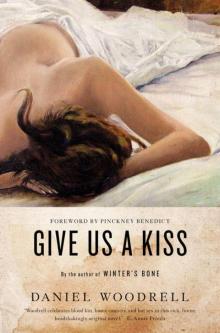 Give Us a Kiss: A Novel
Give Us a Kiss: A Novel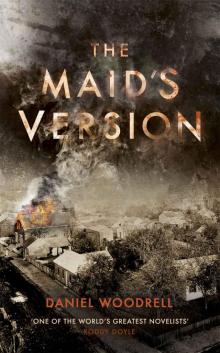 The Maid's Version
The Maid's Version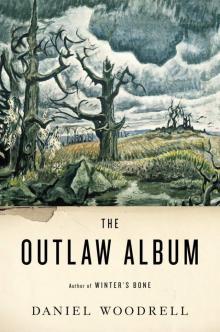 The Outlaw Album: Stories
The Outlaw Album: Stories Tomato Red
Tomato Red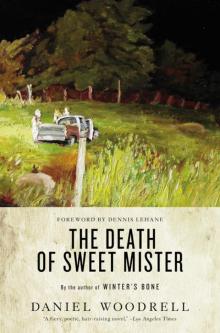 The Death of Sweet Mister
The Death of Sweet Mister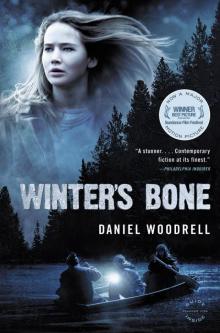 Winter's Bone
Winter's Bone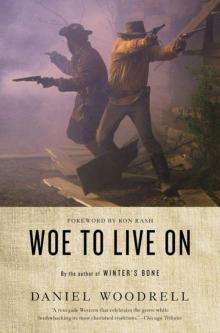 Woe to Live On: A Novel
Woe to Live On: A Novel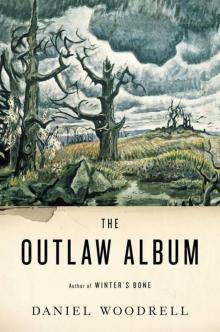 The Outlaw Album
The Outlaw Album